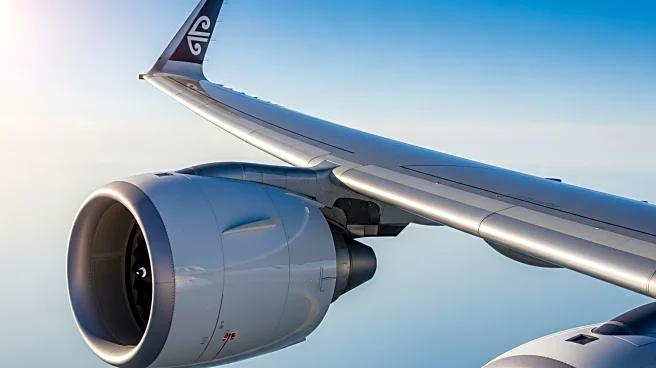What's Happening?
Air New Zealand is dealing with significant operational disruptions due to persistent engine issues affecting its fleet. The airline has experienced grounding of several aircraft, including narrowbody Airbus A321neos and widebody Boeing 787s, due to problems with Pratt & Whitney geared turbofan (GTF) and Rolls-Royce Trent 1000 engines. CEO Greg Foran highlighted the unexpected depth and persistence of these issues, which have led to a reduction in Available Seat Kilometers (ASKs) by 4%. The airline is working towards recovery by introducing new aircraft and implementing a redesigned turbine blade for the Trent 1000 engines to improve durability.
Why It's Important?
The engine issues faced by Air New Zealand have broader implications for the airline industry, particularly in terms of operational reliability and maintenance costs. The grounding of aircraft affects the airline's capacity to meet passenger demand, potentially impacting revenue and customer satisfaction. The introduction of new aircraft and improved engine components is crucial for restoring operational efficiency and reducing maintenance burdens. This situation underscores the importance of reliable engine performance and the challenges airlines face when dealing with technical disruptions.
What's Next?
Air New Zealand plans to gradually improve its fleet operations as new aircraft are delivered and the redesigned turbine blades are installed. The phased introduction of these components is expected to alleviate the number of aircraft on ground events and reduce operational restrictions. The airline will continue to monitor the situation closely and work with engine manufacturers to ensure long-term reliability and performance improvements.
Beyond the Headlines
The ongoing engine issues highlight the critical role of technological advancements and engineering solutions in the aviation industry. The collaboration between airlines and engine manufacturers to address these challenges reflects the industry's commitment to safety and efficiency. Long-term shifts in maintenance practices and fleet management strategies may emerge as airlines seek to prevent similar disruptions in the future.











